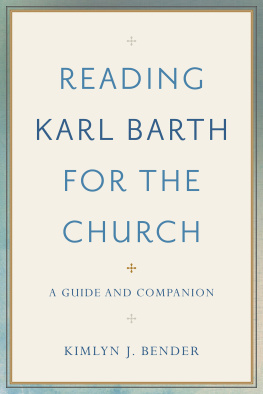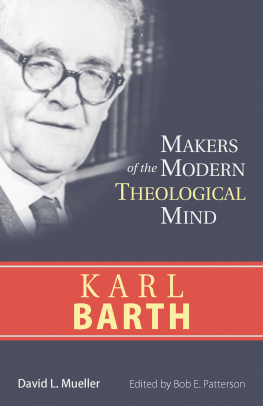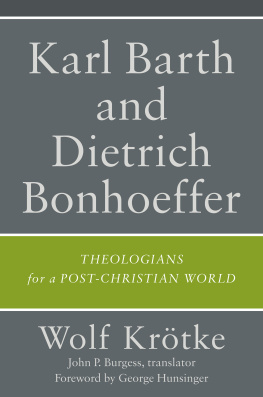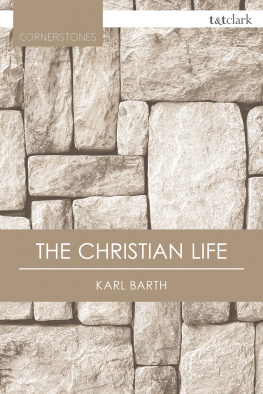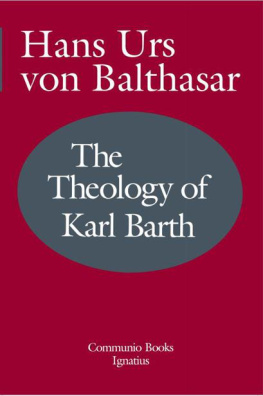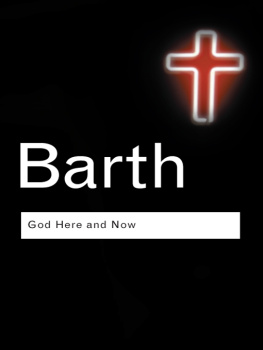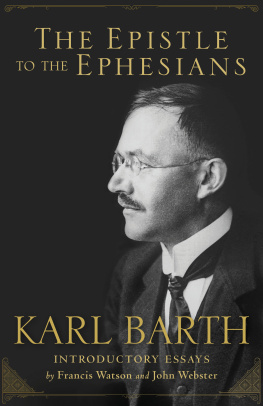1. Introduction
2. Dogmatics as a Theological Discipline of the Church: CD 12
3. Church Proclamation and Dogmatics: CD 3
4. The Threefold Form of the Word of God: CD 4
5. The Nature and Knowability of the Word of God: CD 57
6. The Triune God: CD 812
7. The Incarnation of the Word: CD 1315
8. The Outpouring of the Holy Spirit: CD 1618
9. Holy Scripture: CD 1921
10. Church Proclamation and Dogmatics Revisited: CD 2224
Detailed Contents
Cover
Half Title Page
Title Page
Copyright Page vi
Dedication
Epigraph
Abbreviations
Preface
1. Introduction
G ETTING O RIENTED
A DDENDUM
G ETTING S TA RTED
R EADING F URTHER O N AND F URTHER I N
Introductory Works
Intermediate Works
Advanced Works
2. Dogmatics as a Theological Discipline of the Church: CD 12
T HE T ASK OF D OGMATICS (1)
The Church, Theology, Science (1.1); Dogmatics as an Enquiry (1.2); Dogmatics as an Act of Faith (1.3)
- Excursus: The Being of the Church
T HE T ASK OF P ROLEGOMENA TO D OGMATICS (2)
The Necessity of Dogmatic Prolegomena (2.1); The Possibility of Dogmatic Prolegomena (2.2)
- Excursus: Evangelical Dogmatics in Opposition to Two Rival Traditions
The Nature and Task of Theological Reflection and Dogmatics
The Relation of Christ and the Church
Q UESTIONS FOR R EFLECTION
3. Church Proclamation and Dogmatics: CD 3
C HURCH P ROCLAMATION AS THE M AT ERIAL OF D OGMATICS (3)
Talk about God and Church Proclamation (3.1)
Dogmatics and Church Proclamation (3.2)
C OMMENTARY
Preaching and Proclamation in the Life of the Church
Preaching and the Question of Human Religiosity
Dogmatic Theology and the Ministry of the Church
Q UESTIONS FOR R EFLECTION
4. The Threefold Form of the Word of God: CD 4
T HE W ORD OF G OD IN I TS T HREEFOLD F ORM (4)
The Word of God Preached (4.1)
The Word of God Written (4.2)
The Word of God Revealed (4.3)
The Unity of the Word of God (4.4)
C OMMENTARY
The Word of God, Christology, Scripture, and Proclamation
The Divine Word of God and the Human Words of Scripture
Q UESTIONS FOR R EFLECTION
5. The Nature and Knowability of the Word of God: CD 57
T HE N ATURE OF THE W ORD o F G OD (5)
The Question of the Nature of the Word of God (5.1)
The Word of God as the Speech of God (5.2)
The Speech of God as the Act of God (5.3)
The Speech of God as the Mystery of God (5.4)
T HE K NOWABILITY OF THE W ORD OF G OD (6)
The Question of the Knowability of the Word of God (6.1)
The Word of God and Man (6.2)
The Word of God and Experience (6.3)
The Word of God and Faith (6.4)
The Problem of Dogmatics (7.1)
Dogmatics as a Science (7.2)
The Problem of Dogmatic Prolegomena (7.3)
C OMMENTARY
The Word of God and Direct Appeals to the Holy Spirit
Q UESTIONS FOR R EFLECTION
6. The Triune God: CD 812
G OD IN H IS R EVELATION (8)
The Place of the Doctrine of the Trinity in Dogmatics (8.1)
The Root of the Doctrine of the Trinity (8.2)
- Excursus: The Christocentric Basis of the Doctrine of the Trinity
Vestigium Trinitatis (8.3)
T HE T RIUNITY OF G OD (9)
Unity in Trinity (9.1)
Trinity in Unity (9.2)
Triunity (9.3)
The Meaning of the Doctrine of the Trinity (9.4)
G OD THE F ATHER (10)
God as Creator (10.1); The Eternal Father (10.2)
G OD THE S ON (11)
God as Reconciler (11.1); The Eternal Son (11.2)
G OD THE H OLY S PIRIT (12)
God as Redeemer (12.1); The Eternal Spirit (12.2)
C OMMENTARY
The Doctrine of the Trinity as a Biblical Question
The Doctrine of the Trinity and the Particuar Identity of God
Q UESTIONS FOR R EFLECTION
7. The Incarnation of the Word: CD 1315
G OD S F REEDOM FOR M AN (13)
Jesus Christ the Objective Reality of Revelation (13.1)
Jesus Christ the Objective Possibility of Revelation (13.2)
T HE T IME OF R EVELATION (14)
Gods Time and Our Time (14.1)
The Time of Recollection (14.3)
T HE M YSTERY OF R EVELATION (15)
The Problem of Christology (15.1)
Very God and Very Man (15.2)
The Miracle of Christmas (15.3)

